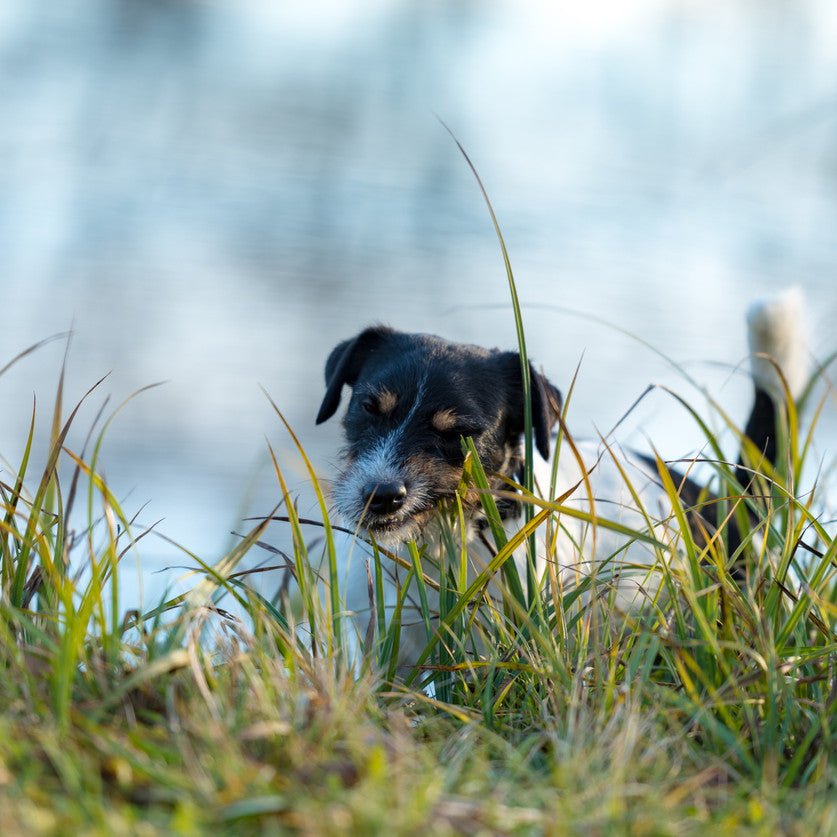Dog Science Series: Why Do Dogs Actually Eat Grass?

Every pet has its own unique personality. Some dogs are quirkier than others though. Whether it's a post-bath zoomies session, or an unquenchable prey drive when the neighborhood squirrels start chattering, every dog has its own set of habits and canine behaviors. One of the more popular pastimes you'll find is when dogs eat grass. According to Pets WebMD, a whopping 79% of all canines companions have visited the salad bar at least once in their lifetime.
Why do dogs eat grass? Are reasons like an upset stomach or intestinal parasites just an old wives tale? Do some dogs just enjoy the taste of grass? Today, we're going to take an in-depth look and answer that burning question, "Why does my dog eat grass?"
Why Do Dogs Eat Grass?
Let's say you're at a dog park alongside other well-meaning pet parents, and one of your canine companions decides to mow the lawn and scoop up some extra roughage. Someone will inevitably say, "That dog must have an upset stomach," or "Maybe that dog needs to throw up."
Truth be told, chowing down on the landscaping has little to do with a dog's vomit. According to the above-cited article, only a paltry 25% of dogs throw up after eating grass. Instead there is a laundry list of reasons your furry friend might be displaying the traits of an omnivore. It should be noted that chewing grass is normal dog behavior; some animals just enjoy the taste of grass.
Think there's more to it than that? Below are the most common reasons that dogs eat grass.
Dietary reasons
Most high-quality dog food is formulated with a dog's needs in mind, i.e. a balanced diet. Like any other living organism, however, things get out of whack from time to time. Often, dogs eat grass due to a nutritional deficiency. Typical deficiencies include:
- Lack of roughage or dietary fiber
- Lack of core nutrients
In order to keep their digestion running smoothly, dogs require a steady source of fiber as well as a balanced diet of key nutrients. If your current dog food just isn't cutting it, your canine companion might search out greener pastures for a quick snack.
Pica
Does your dog regularly try to eat non-food items? Do they chew compulsively on sticks, stones, pinecones, or any item in your house that's not tied down? If so, your canine companion may be suffering from a condition known as "pica." While pica is a big deal in the human world, it usually isn't a cause for concern in canines.
Pica is a condition marked by the compulsive need to chew —and consume— non-food items. Usually pica is a result of inadequate mental stimulation or high anxiety. As a result, pica could be a major reason why dogs eat grass.
Boredom
While pica and boredom go hand in hand, it's worth dedicating a little extra time to the topic. No matter the breed, every dog needs daily opportunities for mental stimulation, especially younger dogs. If your dog lacks sufficient opportunities to get out and romp, they may turn to eating grass to satisfy themselves. There are better alternatives to grazing, however. Instead of letting your dog till the field, try:
- High-energy playtime
- Frequent walks
- Puzzle toys
You can drastically improve your best friend's mental health and behavior by providing healthy outlets for their energy rather than allowing amateur horticulture.
Instinct versus evolution
We think of dogs as consummate carnivores. They are, after all, descendants of the mighty wolf. In reality, however, wild dogs are omnivores. Canine species have sought roughage through plant consumption for thousands of years. It's in their DNA. That trait has transferred to domesticated animals as well, affecting every dog breed imaginable.
To settle an upset stomach
While an upset stomach is pretty far down on the list of reasons that dogs eat grass, it is a reason nonetheless. This is particularly true when it comes to an empty stomach.
If a dog is hungry and operating on an empty stomach, they may produce a kind of yellow bile. Grass has a natural antacid effect, so your canine companion might turn to it for relief in a pinch.
Intestinal parasites
Most of the reasons on our list are no big deal. Intestinal parasites are, however. Common canine parasites include:
- Roundworms
- Hookworms
Sometimes eating grass can be a sign of illness. While eating grass in and of itself is no big deal, observe the frequency with which your pet indulges, coupled with the quality and aspect of their daily poop. If you suspect something is off, don't hesitate to contact your pet's veterinarian.
Should I Stop My Dog From Eating Grass?
Do dogs eat grass? All the time. Should I stop my dog from doing so? Probably not.
By and large, grass isn't harmful to your dog. As you can see from the list above, most causes are easily fixed —if they require fixing at all. There are, however, a few times that you should stop your canine companion from eating grass. If there are pesticides or herbicides sprayed on the lawn, stop your dog immediately. Ingesting chemical agents can make your dog very sick.
If you suspect signs of illness, you should also stop your dog from eating grass and get them to a vet. Otherwise, your furry companion is good to go!
What Are the Health Benefits of Dogs Eating Grass?
Dogs who eat grass get a bad rep. The behavior is often associated with sickness or anxiety. In reality, there are a number of benefits to dogs eating grass. It is primarily a way for dogs to help balance their diet. Grass provides the balanced diet, fiber, and nutrients that they need in order to thrive.
Vegetation is also a great way for dogs to stay hydrated. If you see your friend eating grass on a hot day, they may be thirsty. Plants are an excellent source of water for thirsty pets.
Finally, eating grass is natural for a dog. It gives them purposeful activity to occupy their mind. If you have an extremely playful friend, grass is just another outlet for their energy.
FAQs:
How does grass make dogs feel better?
Dogs produce yellow, acidic bile when their stomachs are empty. Grass has an antacid effect that helps soothe upset stomachs, preventing the dog from throwing up.
Do dogs eat grass to settle their stomach?
Yes, but not as often as you'd think. Dogs do eat grass for its antacid effect. This is one of the least common reasons that they eat grass, however.
Does my dog like the taste of grass?
Grass contains a large amount of dietary fiber and key nutrients as well as water. While it's impossible to say whether an animal likes that taste, the evidence is certainly compelling. Many dogs, especially wild dogs, supplement their intake using grass.
Be sure to follow Animals Matter for the latest trends in Luxury dog beds, bath supplies, and pet apparel.
Subscribe
Sign up to get the latest on sales, new releases and more…
Categories
- Halloween Safety Tips for Dogs: How to Keep Your Companion Safe This Spooky season
- Tails of Celebration: Día de los Muertos / Day of the Dead for Pets, A Festival of Memory in Mexico
- How to Care for Senior Dogs in Fall: Mobility Tips & Joint Support
- Tails of Celebration: Kukur Tihar & The Tihar Festival of Nepal
- What is a VDI Testing for dogs ? : Insights, Procedures and Preventive Measures
- Cheap Dog Beds vs. Luxury Dog Beds: The Real Cost of a $50 "Disposable" Dog Bed
- Can Dogs Have OCD? Understanding Canine Compulsive Behaviors (CCD)
- Does My Dog Like Music? Find Out What Tunes Make Your Pup Wag!
- Effective Solutions for Food Aggression in Dogs
- 7 Frozen Treats Your Dog Will Love This Summer☀️🧊🍉
- The Best Waterproof Liners for Dog Beds: Protect Against Spills, Drool, and Accidents
- How to Cope with the Loss of a Dog: A Tribute to Every Companion We Carry in Our Hearts
- Top Tips on How to Prevent Matting in Dogs
- Understanding and Managing Dogs with Hip Dysplasia
- The Ultimate Guide to Dog Gut Health: Natural Remedies, Probiotic Insights and Signs of Poor Gut Health
- The Best Supplements for Dogs: Explore Top Picks for Canine Health and Wellness
- How Often Should I Brush My Dog's Teeth? Tips for Optimal Canine Dental Health
- Ultimate Guide on How to Comfort Your Dog During Fireworks this 4th of July
- Managing a Blowing Coat: Essential Grooming Tips for Double-Coated Dogs.
- 5 Daily Habits That Boost Your Dog’s Long-Term Wellness
- Mastering Crate Training a Dog: Tips and Benefits
- Dog Car Seats vs. Seat Covers: What’s The Best Option For Your Companion?
- Best Outdoor Dog Beds: Luxury, Durability, and Unmatched Comfort
- Is My Dog Overweight? Tips to Assess and Help Your Companion
- The Best Faux Fur Dog Beds for Ultimate Pet Comfort of 2025
- Dog Running Guide: How to Start, Train & Stay Safe when running with your Dog
- Indestructible Dog Beds? The Truth Behind the Term
- Top Tips for Effective Exercise for Dogs
- Effective Dog Ear Cleaning: A Step-by-Step Guide for Maintaining Healthy Ears
- How to Manage Dog Aggressive Behaviors: Expert Tips and Advice
- Effective Canine Ear Infection Remedies: Symptoms, Causes & Treatments
- How to Make a New Dog Comfortable in Their New Home - 2025 Guide
- Signs of Dog Allergy Symptoms and How to Help and Prevent Them
- Why Does My Dog Lick Their Paws? Causes and Solutions Explained
- Dog Alzheimer's: Symptoms, Causes, and Treatment Options
- The Legacy of Comfort with the Iconic Animals Matter® Ortho Companion-Pedic® Puff Luxury Dog Bed
- Orthopedic Square Dog Beds: The Ultimate Blend of Luxury, Comfort, and Support
- Loungers: The Ultimate Beds for Luxury, Comfort, and Orthopedic Support
- Square Dog Beds: Orthopedic Comfort and Stylish Designs for Your Companion
- Effective Solutions for Canine Incontinence: Identifying Causes and Best Treatments
- Ethical, Sustainable, and Certified: Why Certified Products Matter, Exploring CA Prop 65 and CertiPUR-US® Standards
- Dog Seizures: Signs, Causes, and How to Help Dogs with Seizures
- Celebrate National Dog Day: Here are ideas for Dog Lovers and a dive into the history of our canine companions.
- Top Memory Foam Dog Beds for Comfort and Support
- The Best Beds for Arthritic Dogs: Comfort and Support for Your Furry Companion
- 8 Best Tips for a Comforting Dog
- Cozy Comfort for Pets: The Best Puff Dog Bed
- Ultimate Comfort Outdoors: Choosing the Best Outdoor Dog Bed for Your Pet
- Best Back Seat Extender for Dogs: 2025 Top Choices Reviewed for Travel
- Ultimate Comfort: Find the Best Dog Bed Bolster for Your Companion's Rest


Leave a comment
Please note, comments must be approved before they are published